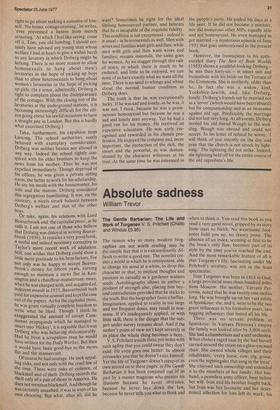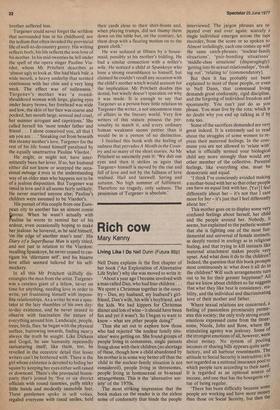Absolute sadness
William Trevor
The Gentle Barbarian: The Life and Work of Turgenev V. S. Pritchett (Ghetto and Windus £5.95)
The reason why so many modern biographies are not worth reading may be the simple fact that it is extraordinarily difficult to write a good one. The novelist creates a world in which he is omnipotent, able to change his mind at a whim, to drop this character or that, to implant thoughts and passions as casually as a gardener scatters seeds. Autobiography allows its author a position of strength also, placing him beyond contradiction provided that he sticks to the truth. But the biographer faces a baffler. Imagination, applied to reality in too large and too frequent doses, may result in nonsense. If it's inadequately applied, or with little skill, there is the danger that the subject under survey remains dead. And if the author's point of view isn't kept severely in its place the whole thing becomes a bore. V. S. Pritchett avoids these pot-holes with such agility that you could swear they don't exist. He even goes one better: he almost persuades you that he doesn't exist himself. Yet the life of Turgenev doesn't creep of its own accord on to these pages: in The Gentle Barbarian it has been conjured out of its past by a master magician who creates his illusions because he never obtrudes, because he never lays down the law, because he never tells you what to think and .when to think it. You read this book as you read a very good novel, gripped by its story from start to finish. No wearisome footnotes hold you up, no dreary prose. The absence of an index, seeming at first to be the book's only flaw, becomes part of its style by the time you've reached the end. And the most remarkable feature of all is that Turgenev's life, fascinating under Mr Pritchett's scrutiny, was not in the least spectacular.
Ivan Turgenev was born in 1818 in Orel, a large provincial town three hundred miles from Moscow. His mother, Varvara Petrovna, noted that he was twenty-one inches long. He was brought up on her vast estate at Spasskoye: she, and it, were to be the two great influences in his formative years, two nagging influences that lasted all his life.
There was no servant problem at Spasskoye: in Varvara Petrovna's empire the family was looked after by 5,000 serfs. She had a chamberlain and a serf orchestra. When cholera raged near by she had herself carried around the estate on a glass-encased chair. She owned whole villages and their inhabitants, 'every horse, cow, pig, goose, even the nightingales that sang in the trees'. She enjoyed such ownership and extended it to the members of her family. Her husband, a penniless army officer, bent before her will. Ivan and his brother fought back, but Ivan was her favourite and her determined affection for him left its mark; his brother suffered less.
Turgenev could never forget the serfdom that surrounded him in his childhood, nor the tedium that often invaded the provincial life of well-to-do country gentry. His writing reflects both; his life reflects the iron love of his mother. In his mid-twenties befell under the spell of the opera singer Pauline Viardot, whom Mr Pritchett describes as 'almost ugly to look at. She had black hair, a wide mouth, a heavy underlip that seemed continuous with her chin and a very long neck. The effect was of sullenness.' Turgenev's mother was 'a roundshouldered woman with large, glaring eyes under heavy brows, her forehead was wide and low, the skin of her face was coarse and pocked, her mouth large, sensual and cruel, her manner arrogant and capricious.' She called herself his 'most tender father and friend . . . I alone conceived you, all that I am you are. . .' Sneaking out from beneath this steamy mother's love, Turgenev for the rest of his life found himself paralysed by the equally unattractive Pauline Viardot.
He might, or might not, have intermittently been her lover. If so, her husband either did not know or accepted the occasional ménage a trois in the understanding way of an older man who happens not to be of a jealous disposition. But Turgenev was timid in love and it all seems fairly unlikely. He never married anyone else; Pauline's children were assumed to be Viardot's.
His pursuit of this couple from one European city to another has an almost comic gavour. When he wasn't actually with Pauline he wrote to remind her of his ardour, even occasionally hoping to make her jealous: he hovered, as he said himself, 'on the edge of another man's nest', His Diary of a Superfluous Man is aptly titled, and not just in relation to the Viardots: recalling Spasskoye, he never ceased to castigate his 'dilettante self', and his bizarre love affair seemed tailored for his selfmockery.
In all this Mr Pritchett skilfully disentangles the man from the artist. Turgenev was a careless giant of a fellow, never on time for anything, needing love in order to write, yet frustrating himself with impossible relationsbips. As a writer he was a spectator at the lazy shambles of his own dayto-day existence, and he never ceased to observe with fascination the nature of everything around him. Landscape, people, trees, birds, flies: he began with the physical surface, burrowing inwards, finding near;y always the truth he sought. Like Dickens and Gogol, he saw humanity repeatedly caricaturing itself; like them, too, he revelled in the eccentric detail that lesser writers can't be bothered with. There is the girl whose existence is devoted to hiding her squint by keeping her eyes either well raised or downcast. There's the provincial houseparty that's joined by 'five or six district officials with round tummies, puffy sticky little hands and modestly immobile feet. These gentlemen spoke in soft voi'ces, regaled everyone with timid smiles, held their cards close to their shirt-fronts and, when playing trumps, did not thump them down on the table but, on the contrary, let. them drop with a floating motion on to the green cloth.'
He was seduced at fifteen by a housemaid, possibly at his mother's bidding. He had a similar connection with a miller's wife. He noticed a child at Spasskoye who bore a strong resemblance to himself, but claimed he couldn't recall any occasion with the child's mother which would account for the implication. Mr Pritchett doubts this denial, but wisely doesn't speculate on why it was made. It is enough to say that Turgenev as a person bore little relation to Turgenev the writer, a not uncommon state of affairs in the literary world. Very few writers of this stature possess the personality to match it, and every ordinary human weakness seems pettier than it would be in a person of no distinction.
I finished this book with the feeling of sadness that pervades A Month in the Country and so many of the short stories. As Mr Pritchett so succinctly puts it: 'We dab our eyes and then it strikes us again that Turgenev himself is moved by the rise and fall of love and not by the fullness of love realised. Hail and farewell. Spring and autumn. No high summer of fulfilment. Therefore no tragedy, only sadness. The pessimism of Turgenev is absolute.'















































 Previous page
Previous page